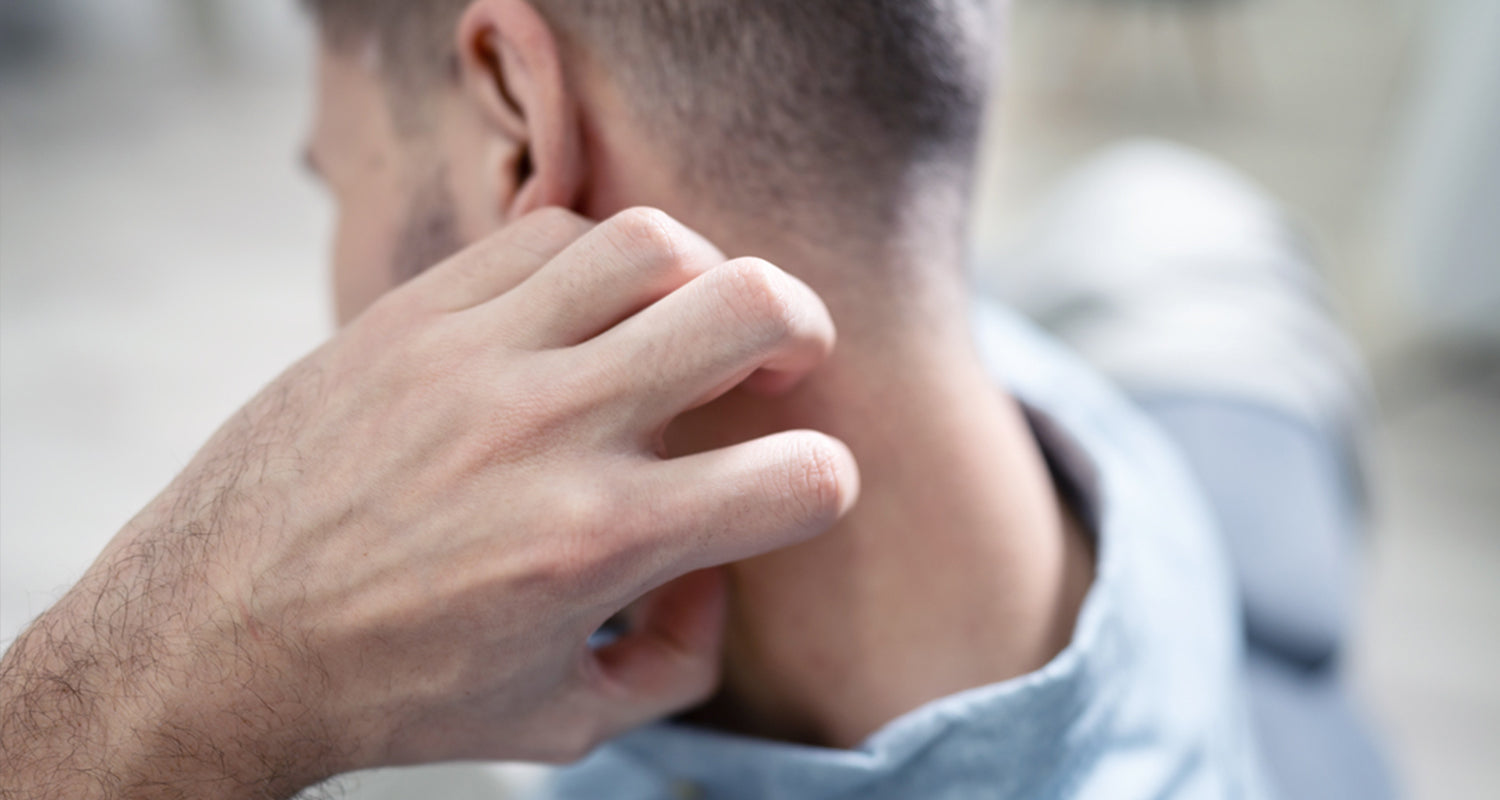Psoriasis is a chronic skin condition characterised by thick, scaly patches of skin. While psoriasis itself does not usually cause hair loss directly, it can lead to shedding in areas affected by inflammation and scaling, particularly on the scalp.
When scalp psoriasis is severe, the build-up of plaques can disrupt the normal hair growth cycle. In some cases, this leads to psoriatic alopecia - a complication that can cause temporary or, more rarely, permanent hair thinning or baldness (NHS).
What is psoriatic alopecia?
Psoriatic alopecia, also called psoriatic hair loss, is a relatively rare complication of scalp psoriasis. It occurs when persistent inflammation and scaling interfere with the normal cycle of hair growth and shedding (PubMed).
-
How it presents:
Symptoms can range from mild dandruff-like flaking to extensive redness, irritation, and thick silvery-white scales. Hair loss may appear patchy or diffuse, and can be accompanied by itching, tenderness, or pain on the scalp. -
Temporary vs. permanent:
In most cases, hair grows back once inflammation is under control. However, repeated or severe inflammation may damage follicles and increase the risk of long-term thinning (PCDS).
Why does scalp psoriasis cause hair loss?
Scalp psoriasis can disrupt hair health in several ways:
- Inflammation and scaling weaken the scalp environment and interfere with follicle growth.
- Scratching or picking at plaques loosens hair shafts and can damage follicles.
- Plaque build-up creates a barrier that stresses the scalp and alters the growth cycle.
Harsh treatments (such as strong tar products or frequent steroid use) may sometimes worsen fragility.
According to Guy’s and St Thomas’ NHS Foundation Trust, hair usually regrows after inflammation clears, but irritation and scratching during flare-ups can worsen hair loss (Guys & St Thomas’).
Treatment for psoriatic alopecia
The main approach to managing psoriatic alopecia is to treat the underlying scalp psoriasis (BMJ DTB):
- Topical corticosteroids to calm inflammation.
- Medicated shampoos (tar, salicylic acid, or prescription) to reduce scaling.
- Moisturising agents to restore scalp comfort.
- Systemic medications (oral retinoids, biologics) in severe cases.
Note: Always consult a dermatologist or healthcare professional for diagnosis and treatment options tailored to your needs.
Can I stop my hair from falling out if I have psoriasis?
While you cannot always prevent hair shedding entirely, there are steps that may reduce it and encourage regrowth:
-
Follow a gentle scalp care routine.
Use mild, fragrance-free shampoos and nourishing conditioners that soothe irritation without over-drying. Products like Olsson Scandinavia® Sensitive Shampoo are formulated to be ultra-lightweight and Allergy Certified, making them supportive choices for sensitive scalps (Psoriasis Association UK). -
Avoid scratching or picking.
Keep nails short and use a soft brush or gentle scalp massage instead of scratching, which can worsen hair loss. -
Stick to prescribed treatments.
If your doctor prescribes topical steroids, medicated shampoos, or biologics, consistency is key. -
Manage stress.
Stress is a known trigger for psoriasis flare-ups and can also contribute to temporary hair shedding (NHS). Relaxation practices like yoga, mindfulness, or gentle exercise may help.
Will my hair grow back after scalp psoriasis?
In most cases, hair regrows once inflammation is controlled and scaling reduced (Guys & St Thomas’). Regrowth may take several months, depending on the severity of shedding. Persistent inflammation or scarring increases the risk of long-term thinning, which is why early treatment and gentle haircare support are so important.
Not all cases of psoriasis lead to hair loss
It’s important to remember that not everyone with scalp psoriasis experiences hair loss. Shedding severity varies from person to person and often depends on how severe the inflammation is and whether the scalp is scratched or irritated (NHS).
If you notice increased shedding or thinning, consult a dermatologist for a full evaluation. They can provide an accurate diagnosis and recommend treatment tailored to your situation.
Key takeaways
-
Psoriatic alopecia is a complication of scalp psoriasis where inflammation disrupts the normal hair cycle.
-
Hair loss may be temporary, and regrowth is common once psoriasis is managed.
-
Gentle, allergy-certified haircare products can support scalp comfort and reduce irritation alongside medical treatments.
-
A dermatologist’s guidance is essential for managing both scalp psoriasis and associated hair loss.


